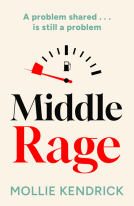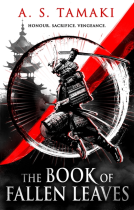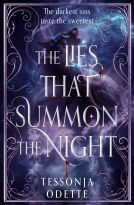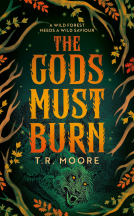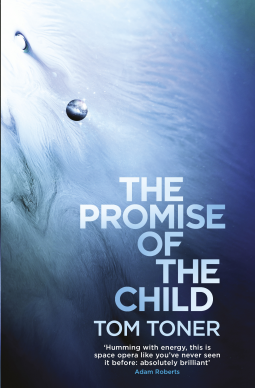
The Promise of the Child
by Tom Toner
This title was previously available on NetGalley and is now archived.
Send NetGalley books directly to your Kindle or Kindle app
1
To read on a Kindle or Kindle app, please add kindle@netgalley.com as an approved email address to receive files in your Amazon account. Click here for step-by-step instructions.
2
Also find your Kindle email address within your Amazon account, and enter it here.
Pub Date 13 Oct 2016 | Archive Date 1 Apr 2020
Orion Publishing Group | Gollancz
Description
An extraordinarily inventive and hugely original SF novel that charts a compelling vision of a future and spins an hypnotic narrative around it. A novel that could command the same amount of attention and furore that met the publication of The Quantum Thief. The richness and originality of its vision combined with its playful take on hard science make this a novel with real commercial potential that will be talked about for years and should launch a major career in SF.
In the far future man has spread out into the galaxy. And diversified. Some have evolved physically into strange new forms, some have become immortal. Some hark back to the old ways. We have built a glorious new future. One that stretches from the sleepy Old World, to new terraformed planets and Dyson spheres built around artificial suns. For as long as we can remember (and some have lived 12,000 years) we have delighted in a rich new existence. Yes there have been wars but we are content in our splendour. Art is revered, life is easy, death forgotten for many. But now there are rumours of a bid to oust the Emperor and a worrying story that our history is not as we remember it - not only man left Earth...
Available Editions
| EDITION | Paperback |
| ISBN | 9781473211377 |
| PRICE | £8.99 (GBP) |
Average rating from 36 members
Featured Reviews
 Alex B, Reviewer
Alex B, Reviewer
I'm 10% in, and am already confident enough to state that Toner is a major new voice in Sci-fi, maybe even reaching the heights of Iain M Banks.
This book was advertised as Space Opera. Space Opera to me is something light weight, set in the future outer-space with aliens, usually involving a battle, and clear cut goodies and baddies. This was anything but light weight – it is a monumental epic spanning millennia, with a cast of thousands, though it does have a monster battle near the end.
There are no real aliens, as the multitude of different species in the universe have all evolved from humans: “the year is 14,647 AD. Humankind has changed, fractured, Prismed into a dozen breeds of fairy-tale grotesques … Man has been resculpted in a hundred different places … When humans … left the world as conquistadors, adventurers, slavers, industrialists and a thousand other things, they found the one thing they weren’t expecting. They found nothing. … The heavens, so promising to earlier eyes, were empty of life. … The phenomenon of life, as far as anyone could tell, was unique, a one-off, beginning and ending on the Old World”. What an amazing premise on which to base a trilogy!
Right and wrong are not clearly delineated. The immortal Amaranthine are pretty much amoral – but that probably goes with the godlike lifespan and the supernatural powers. Much of the book is more like a fantasy novel than science fiction. But then a light bulb would probably seem like magic to a human from the Dark Ages. This is a kind of post-science universe – all real innovation is in the past. The Amaranthine can translocate between planets using their minds and the planet’s magnetic fields, and so have no need for space-ships. The other species use irreplaceable scavenged ancient “voidships” as the knowledge for making new ones has been lost. Daily life on the planets appears to be almost without advanced technology. However – metals do grow on trees (“The metal was indeed worn, greenly oxidised copper, not the grown stuff that never turned bad”) and plants are pollinated by drones. The one exception is the weapon of mass destruction made by Corphuso, but even he does not seem to understand what he has created.
The first few chapters of the book are like self-contained short stories that have no discernible links – they don’t even seem to be in the same universe. Eliska lives in medieval Prague. Sotiris is living in his memories of Earth that was: “The memories were pickled, viewed through the oily layer of whatever preserved them, altering their colour, texture, even their form”. The Lacaille and Vulgar are engaged in a deadly battle that Corphuso is escaping. Only once the maladjusted Lycaste, who lives in and for the present, and in forlorn hope that Pentas will love him, is introduced does the story take on a more traditional linear time-line., and slowly the links are revealed.
Characters are introduced with a minimum of information, and frequently your initial suppositions regarding their appearance and life-style prove unfounded as more details are made available, and as they come into contact with others.
Throughout the language used is wonderful, with beautiful imagery, and a vivid – very visual – imagination. The tale and the created universe are so complex, that I will need to read the book several times before I can take it all in. And this is definitely a book that you will want to read again and again. Hopefully, after the third book is written, the author will have time to compose a compendium of the characters, Prism species, and back histories, from his no doubt copious notes. I look forward to re-read this – and the next two books in the series.
Tom Toner may be the new Steven Erikson of Science Fiction, because he drops the reader straight into an unfamiliar world without any explanation. I'm a fast reader and sometimes tempted to skim more than I should, which works with books set on our world where not every third word is strange and unfamiliar. After reading a third of this novel, almost putting it away for good because I had no idea what was going on, I decided to start from the beginning and take my time.
Whew, what a ride. I've hardly ever been this immersed in another world. Tom Toner presents a world so rich and so fleshed out, I was blown away. It's a creative mix between Science Fiction and Fantasy presenting an innovative future filled with diverse, unique cultures and breathtaking ideas.
Now, let me mention a few negative things, there aren't many, but I think they're important. The first thing that bothered me is that this the first book in a trilogy and it does not stand on its own. It's more a chess board and now all the pieces are set, ready to attack.
The second thing is the complexity of the book. While I personally do not mind not knowing what's going on for a good portion of a book, I think Toner expects a lot of attention from the reader, introducing many characters and a dozen different species and places. I was actually taking notes in the beginning. It's not a fast read either, the prose is beautiful but dense.
The third thing is a small one: one character in particular I had trouble to emphasize with. Lycaste is the typical 'nice guy' who does not understand that a woman can say no and not change her mind. His mind is very childlike though, so maybe he's supposed to just not be mature enough yet. I'm curious to see where Tom Toner is going with him.
Everything else is fantastic. Toner has definitely created something ambitious and memorable. I can't wait to read the other two books and find out more about this universe.
Readers who liked this book also liked:
M. K. Oliver
General Fiction (Adult), Humor, Mystery & Thrillers

